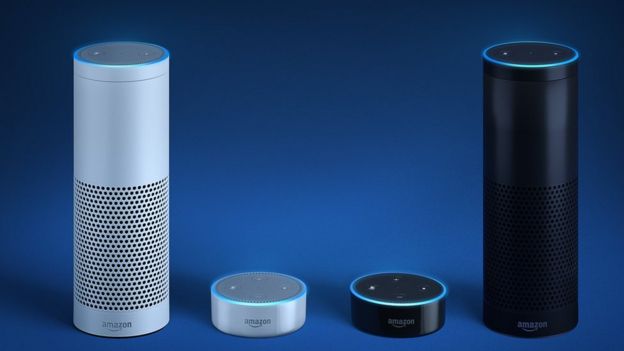Murder detectives sought Amazon Echo data
US police investigating a murder have tussled with oover access to data gathered by one of its Echo speakers.
The voice-controlled device was found near to a hot tub where the victim was found dead amid signs of a struggle.
According to court filings, Amazon was issued with two search warrants but refused to share information sent by the smart device to its servers.
However, the police said a detective found a way to extract some data from the device itself.
The accused killer has yet to be put on trial and it is not clear whether that information proved useful to the investigation.
The prosecutor in the case told the BBC he was still hopeful Amazon would share some further details.
"While many privacy advocates have expressed interest in this case due to the technology involved, this case is really about seeking justice for the victim, who was a husband and a father," Nathan Smith told the BBC.
"The application for a search warrant based on probable cause and approved by a judge is the constitutionally authorised means for law enforcement to conduct lawful searches of homes, property or computer devices like the Amazon Echo.
"Since law enforcement officers followed the constitutionally mandated procedures to obtain a lawful search warrant in this case, I am confident that Amazon will comply."
Blood spots
Details of the case were first reported by the Information news site.
But it dates back to November 2015, when the suspect, James Bates, called the Bentonville, Arkansas police department to say he had found the body of a friend, Victor Collins, face down in water.
The court records say one of deceased's eyes and lips appeared to be swollen and suspected blood spots were found around the rim of the hot tub.
Detectives say they learned that music had been streamed to the back patio at the time of death, which they thought might have been controlled via the Echo's smart assistant Alexa.
 AMAZON
AMAZON
The "always on" machine makes recordings of audio it hears from a fraction of a second before it detects a wake word - either Alexa or Amazon - until it judges the command to be over.
This audio is then transmitted to Amazon's computer servers, which interpret the request and tell it how to respond.
Although no recordings are meant to be made at other times, the device often becomes activated when it misinterprets speech as being its wake command.
Any captured audio might therefore have identified who was active in the early hours of the morning when the alleged murder is thought to have taken place, as well as what was said. Mr Bates claims to have been asleep at the time.
'Overbroad demands'
The case has echoes of Apple's refusal to help the FBI bypass the security code of an iPhone used by a gunman in 2015.
In that case, the authorities were ultimately able to extract information without Apple's aid.
"Amazon will not release customer information without a valid and binding legal demand properly served on us," a spokesman for retail giant told the BBC.
"Amazon objects to overbroad or otherwise inappropriate demands as a matter of course."
The spokesman added that utterances are not stored by Echo devices, and the associated audio is only accessible via the cloud and can be deleted by relevant account holders.
 HUAWEI
HUAWEI
Bentonville's police force said it had also managed to extract data from Mr Collins' LG smartphone.
But it added that it had been unable to access Mr Bates' Huawei Nexus handset because it had been "encrypted at the chipset level" and was protected by a passcode lock.
However, the court papers indicate that the property's smart water meter may have yielded the most useful evidence.
The police say it showed that 140 gallons (636 litres) of water was used around the time of the alleged killing. They suggest this was down to Mr Bates using a garden hose to wash away evidence from his porch before he alerted them to the death.
Post a Comment